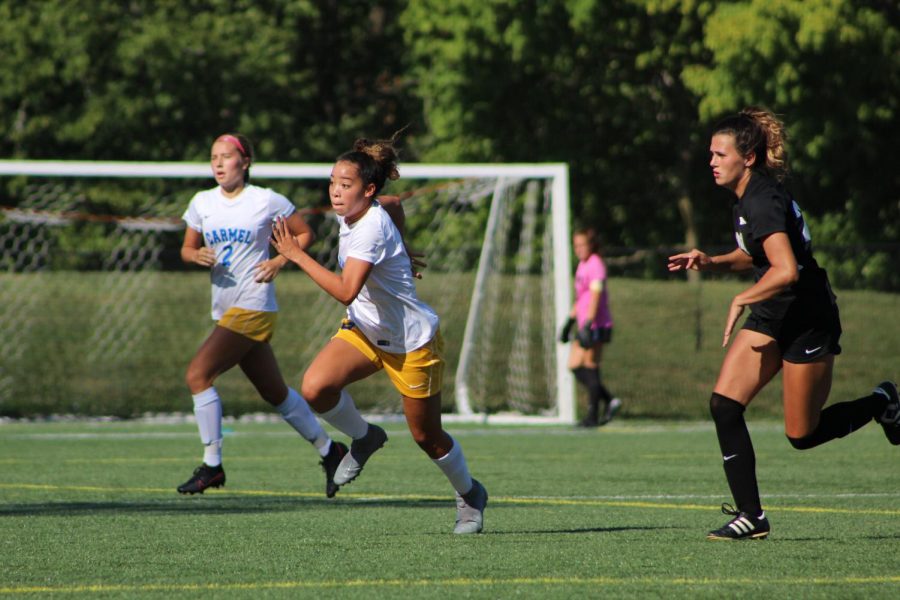In the wake of the Jacob Blake shooting in Kenosha, Wis., players in the National Basketball Association (NBA), rather than continuing the playoffs, surprised many by deciding to completely boycott a game. Such drastic actions are just the latest in a trend of athletes using their platform to spread messages of social justice. Athletes at CHS have also responded and fought against racism in a variety of ways.
Solomon Williams, football player and junior, has started a dialogue with his coaches and teammates on racism and how to best tackle it.
“One of the biggest things for me is having those tough conversations with people in my life: my best friends, relatives, teachers, coaches,” Williams said.
He adds that he tries to show others his perspective on these issues with these conversations.
“I think having those conversations, even though they may be awkward and hard, is one of the most important things that you can do,” he said, “a lot of other people just don’t understand where you are coming from, and it’s not their fault; they just don’t understand it. So having those conversations helps give them a little bit of my point of view and helps them empathize a little bit more.”
Williams said being an athlete makes him and his teammates the center of attention, and rather than shying away from making a statement, he actually embraces being in the spotlight.
“I think sports do put me in a position where I have a lot of eyes on me, where I have a lot of people looking at me, and I like that position because it puts me in a place where I can be a good influence on not only other African-American kids, but also white and non-black athletes and students as well,” he said.
Williams said that a discussion over whether or not to make some sort of public gesture has taken place among him and his teammates, but they do not know if they are going to take such an action.
In the event that an athlete were to make some gesture, e.g. kneeling or raising his fist during the playing of the national anthem, they would not be prohibited from doing so. According to Assistant Athletics Director Jeff Hester, athletes may take such an action, as long as there is adequate communication with coaches and teammates and everyone is fine with it.
Other athletes have chosen to take action outside of athletics. Saliyah Brady, a member of the women’s varsity soccer team and junior, has decided to take part in direct action by going to public demonstrations.
“I have been to some protests and I have also hosted a town hall meeting where people can come and discuss and ask questions about this issue,” Brady said.
Brady stresses that her actions and this movement are not meant to be divisive, and the slogan “Black Lives Matter” does not necessarily imply other lives do not.
“Black lives exist, and all lives that exist do matter. But black lives specifically are being discriminated against right now, which is why we have this movement and why we are protesting,” she said.
Ultimately, part of what Brady wishes to bring about through her protests and actions is police reform and more accountability within police departments.
“This issue is much too large to solve quickly, but I think something that should be done is to have police go through more training. Police in the US have some of the least training in the world, so having more training for police would help them handle these situations safely,” Brady said.
In the end, Williams hopes these protests and conversations over racism can lead to lasting changes in society for the better.
Williams said, “Although this is an unsure and divisive time in our country, I think that it is an opportunity to draw together and to become a more united society that is more inclusive to people of all backgrounds and ethnicities.”

































![AI in films like "The Brutalist" is convenient, but shouldn’t take priority [opinion]](https://hilite.org/wp-content/uploads/2025/02/catherine-cover-1200x471.jpg)









































![Review: “The Immortal Soul Salvage Yard:” A criminally underrated poetry collection [MUSE]](https://hilite.org/wp-content/uploads/2025/03/71cju6TvqmL._AC_UF10001000_QL80_.jpg)
![Review: "Dog Man" is Unapologetically Chaotic [MUSE]](https://hilite.org/wp-content/uploads/2025/03/dogman-1200x700.jpg)
![Review: "Ne Zha 2": The WeChat family reunion I didn’t know I needed [MUSE]](https://hilite.org/wp-content/uploads/2025/03/unnamed-4.png)
![Review in Print: Maripaz Villar brings a delightfully unique style to the world of WEBTOON [MUSE]](https://hilite.org/wp-content/uploads/2023/12/maripazcover-1200x960.jpg)
![Review: “The Sword of Kaigen” is a masterpiece [MUSE]](https://hilite.org/wp-content/uploads/2023/11/Screenshot-2023-11-26-201051.png)
![Review: Gateron Oil Kings, great linear switches, okay price [MUSE]](https://hilite.org/wp-content/uploads/2023/11/Screenshot-2023-11-26-200553.png)
![Review: “A Haunting in Venice” is a significant improvement from other Agatha Christie adaptations [MUSE]](https://hilite.org/wp-content/uploads/2023/11/e7ee2938a6d422669771bce6d8088521.jpg)
![Review: A Thanksgiving story from elementary school, still just as interesting [MUSE]](https://hilite.org/wp-content/uploads/2023/11/Screenshot-2023-11-26-195514-987x1200.png)
![Review: "When I Fly Towards You", cute, uplifting youth drama [MUSE]](https://hilite.org/wp-content/uploads/2023/09/When-I-Fly-Towards-You-Chinese-drama.png)
![Postcards from Muse: Hawaii Travel Diary [MUSE]](https://hilite.org/wp-content/uploads/2023/09/My-project-1-1200x1200.jpg)
![Review: "Ladybug & Cat Noir: The Movie," departure from original show [MUSE]](https://hilite.org/wp-content/uploads/2023/09/Ladybug__Cat_Noir_-_The_Movie_poster.jpg)
![Review in Print: "Hidden Love" is the cute, uplifting drama everyone needs [MUSE]](https://hilite.org/wp-content/uploads/2023/09/hiddenlovecover-e1693597208225-1030x1200.png)
![Review in Print: "Heartstopper" is the heartwarming queer romance we all need [MUSE]](https://hilite.org/wp-content/uploads/2023/08/museheartstoppercover-1200x654.png)




